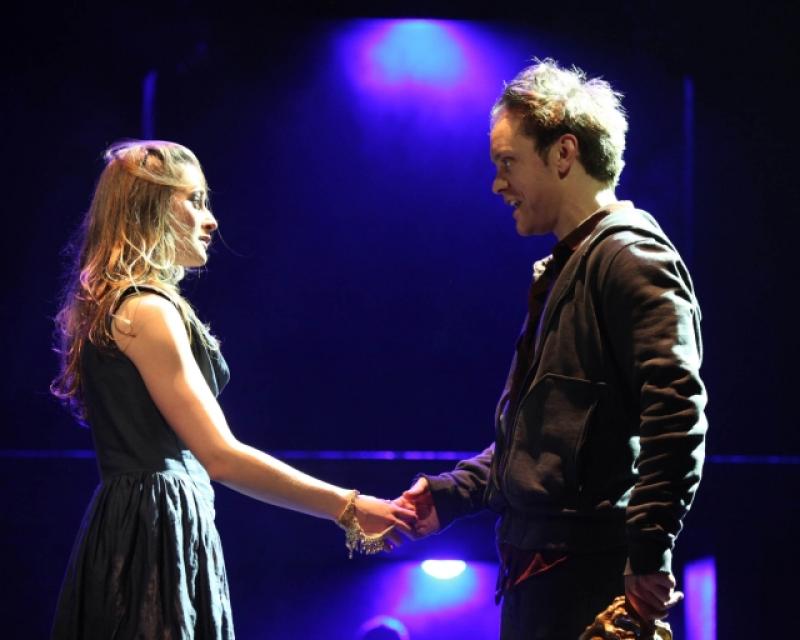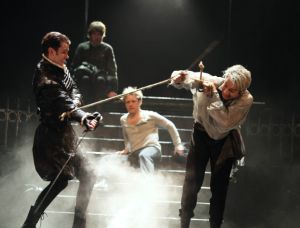Romeo and Juliet, RSC/Roundhouse | reviews, news & interviews
Romeo and Juliet, RSC/Roundhouse
Romeo and Juliet, RSC/Roundhouse
Shakespeare ensemble's London return makes stars of two star-crossed lovers

Can you go home again? That's the question that will be hanging over the Royal Shakespeare Company's first residency at the Roundhouse since their "History Play" cycle stormed north London over two years ago, reminding those lucky enough to catch it of the loss to the capital ever since the RSC opted out of a London base of operations.
The happy news is that Rupert Goold's transfer of his Romeo and Juliet, first seen in Stratford-upon-Avon this past March, boasts two truly thrilling performances from Sam Troughton and Mariah Gale in the title roles, which are here taken with a singular ferocity and intelligence not encountered in this play in some time. And if some of the directorial flourishes are either silly or unnecessary, in turn allowing for the odd supporting performance or two whose eccentricities quickly pall, all cavils fall away faced with the central players. The ongoing interest, of course, will lie in seeing how the other stagings stack up (Antony and Cleopatra, starring Kathryn Hunter, is up next), not to mention how the productions fare upon transferring to New York next summer.
You'll doubtless have heard by now of Goold's conceit, which is to dress his titular duo in contemporary garb (a hoodie for him, jeans and trainers for her), keeping the rest of the ensemble in period dress up until a grievous finale that finds the entire assemblage attired as if for the here and now, so as to speak to an age that understands Shakespeare's tale of tribal warfare with or without West Side Story or the likes of Baz Luhrmann to move the references on. Romeo starts the play tapping into Shakespeare's Prologue via an audio guide and, later, whizzes on and off by means of a bicycle: precisely the sorts of Goold-isms that will in no way surprise followers of this director over the years.
What is startling is the joint reinvention of both leading roles, starting with Troughton's appealing, likeable Romeo, a young swain miles removed from the decidedly wet egotist that this part has become over time - not least because Romeo is quite possibly the greatest solipsist of any Shakespeare lover. (Even in death, his final words read: "Thus with a kiss I die." That's to say, Juliet who?) Gale, blessed with easily the richer part, is a genuine sensation, a child-woman who visibly matures over the course of three-plus hours - so much for the "two hours' traffic of our stage" erroneously promised by the author - on the way to a reckoning with her actual groom, namely death, that seems ripped from far within the gut. Rarely have I felt Juliet's world so fully closing down around her - one, she informs us, "past hope, past care, past help", whereby suicide comes to seem her only source of empowerment.
 I could have done without Forbes Masson's effortful Friar Laurence, the open-toed sandals suggesting a refugee from Godspell, and Jonjo O'Neill (pictured right in duelling mode) makes a flouncy, irksome hash out of the foolproof (or so one has always thought) role of Mercutio, the Queen Mab speech here so mannered that a paean to poetic invention and linguistic extravagance becomes an invitation to switch off. The physical production, too, could tone down the lapping flames that project a Hammer Horror feel on to Tom Scutt's multileveled design, Howard Harrison's funereal lighting doubtless taking its cue from the Prince's closing adjective, "glooming", that I have yet to encounter elsewhere.
I could have done without Forbes Masson's effortful Friar Laurence, the open-toed sandals suggesting a refugee from Godspell, and Jonjo O'Neill (pictured right in duelling mode) makes a flouncy, irksome hash out of the foolproof (or so one has always thought) role of Mercutio, the Queen Mab speech here so mannered that a paean to poetic invention and linguistic extravagance becomes an invitation to switch off. The physical production, too, could tone down the lapping flames that project a Hammer Horror feel on to Tom Scutt's multileveled design, Howard Harrison's funereal lighting doubtless taking its cue from the Prince's closing adjective, "glooming", that I have yet to encounter elsewhere.
And yet, the staging is smart where it counts most and sustains interest in a time-honoured text that remains far more robust, dense and deeply nihilistic than Romeo and Juliet is often credited with being. ("Leave me to myself tonight," requests Juliet, as if solitude were in fact her default state of being.) Perhaps the ultimate accolade rests with the held silence - an idiot nut-chomper over the aisle from me notwithstanding - with which a noticeably young audience lapped up proceedings throughout. In the end, it's as if Shakespeare trumps any trickery Goold can throw at him, leaving the play to hurtle ever-forward towards its characters' collective date with destiny. Death, where is thy sting? For the next month or so, look no further than the Roundhouse.
Share this article
Add comment
The future of Arts Journalism
You can stop theartsdesk.com closing!
We urgently need financing to survive. Our fundraising drive has thus far raised £49,000 but we need to reach £100,000 or we will be forced to close. Please contribute here: https://gofund.me/c3f6033d
And if you can forward this information to anyone who might assist, we’d be grateful.

Subscribe to theartsdesk.com
Thank you for continuing to read our work on theartsdesk.com. For unlimited access to every article in its entirety, including our archive of more than 15,000 pieces, we're asking for £5 per month or £40 per year. We feel it's a very good deal, and hope you do too.
To take a subscription now simply click here.
And if you're looking for that extra gift for a friend or family member, why not treat them to a theartsdesk.com gift subscription?
more Theatre
 Ragdoll, Jermyn Street Theatre review - compelling and emotionally truthful
Katherine Moar returns with a Patty Hearst-inspired follow up to her debut hit 'Farm Hall'
Ragdoll, Jermyn Street Theatre review - compelling and emotionally truthful
Katherine Moar returns with a Patty Hearst-inspired follow up to her debut hit 'Farm Hall'
 Troilus and Cressida, Globe Theatre review - a 'problem play' with added problems
Raucous and carnivalesque, but also ugly and incomprehensible
Troilus and Cressida, Globe Theatre review - a 'problem play' with added problems
Raucous and carnivalesque, but also ugly and incomprehensible
 Clarkston, Trafalgar Theatre review - two lads on a road to nowhere
Netflix star, Joe Locke, is the selling point of a production that needs one
Clarkston, Trafalgar Theatre review - two lads on a road to nowhere
Netflix star, Joe Locke, is the selling point of a production that needs one
 Ghost Stories, Peacock Theatre review - spirited staging but short on scares
Impressive spectacle saves an ageing show in an unsuitable venue
Ghost Stories, Peacock Theatre review - spirited staging but short on scares
Impressive spectacle saves an ageing show in an unsuitable venue
 Hamlet, National Theatre review - turning tragedy to comedy is no joke
Hiran Abeyeskera’s childlike prince falls flat in a mixed production
Hamlet, National Theatre review - turning tragedy to comedy is no joke
Hiran Abeyeskera’s childlike prince falls flat in a mixed production
 Rohtko, Barbican review - postmodern meditation on fake and authentic art is less than the sum of its parts
Łukasz Twarkowski's production dazzles without illuminating
Rohtko, Barbican review - postmodern meditation on fake and authentic art is less than the sum of its parts
Łukasz Twarkowski's production dazzles without illuminating
 Lee, Park Theatre review - Lee Krasner looks back on her life as an artist
Informative and interesting, the play's format limits its potential
Lee, Park Theatre review - Lee Krasner looks back on her life as an artist
Informative and interesting, the play's format limits its potential
 Measure for Measure, RSC, Stratford review - 'problem play' has no problem with relevance
Shakespeare, in this adaptation, is at his most perceptive
Measure for Measure, RSC, Stratford review - 'problem play' has no problem with relevance
Shakespeare, in this adaptation, is at his most perceptive
 The Importance of Being Earnest, Noël Coward Theatre review - dazzling and delightful queer fest
West End transfer of National Theatre hit stars Stephen Fry and Olly Alexander
The Importance of Being Earnest, Noël Coward Theatre review - dazzling and delightful queer fest
West End transfer of National Theatre hit stars Stephen Fry and Olly Alexander
 Get Down Tonight, Charing Cross Theatre review - glitz and hits from the 70s
If you love the songs of KC and the Sunshine Band, Please Do Go!
Get Down Tonight, Charing Cross Theatre review - glitz and hits from the 70s
If you love the songs of KC and the Sunshine Band, Please Do Go!
 Punch, Apollo Theatre review - powerful play about the strength of redemption
James Graham's play transfixes the audience at every stage
Punch, Apollo Theatre review - powerful play about the strength of redemption
James Graham's play transfixes the audience at every stage
 The Billionaire Inside Your Head, Hampstead Theatre review - a map of a man with OCD
Will Lord's promising debut burdens a fine cast with too much dialogue
The Billionaire Inside Your Head, Hampstead Theatre review - a map of a man with OCD
Will Lord's promising debut burdens a fine cast with too much dialogue

Comments
...